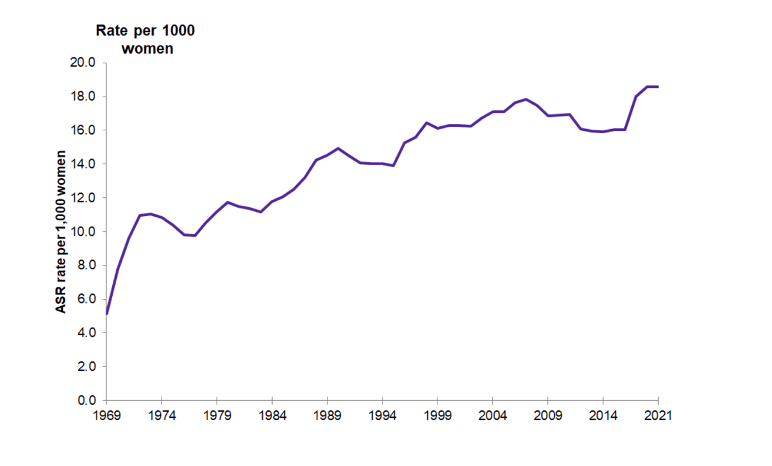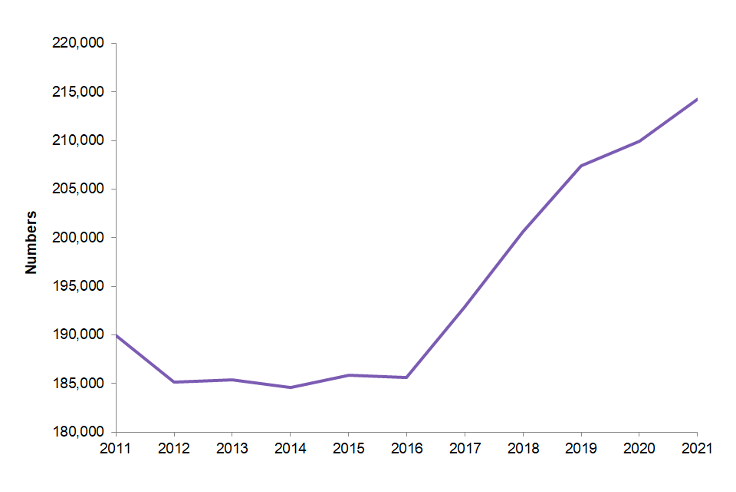Abortion: Current Legal Challenges and Opportunities
A Call to Pray and Not Give Up
This article first appeared in our Social Issues Bulletin – Issue 55 which is available to download here.

The most recent government data reports that 214,869 babies were aborted in England and Wales in 2021. This is the highest total number (and the highest rate) of abortions in any year since records began. One in four pregnancies now end by abortion.


This is a heartbreaking reality, especially when we remember that behind the cold statistics are lives lost and lives negatively impacted. The legal landscape is also continually shifting, and there continue to be legal challenges seeking both to loosen further and also to tighten the restriction of abortion.
Pills by Post
During the Covid pandemic, rules were temporarily changed so that women could be sent abortion pills in the post after a telephone or online assessment, without the usual step of a face-to-face appointment and an ultrasound scan. The law was changed in March 2022 to allow abortion providers to offer such ‘pills by post’ schemes permanently. Many people warned how dangerous this policy was, including that it might lead to a rise in dangerous late abortions and possibly also coercive abortions. And sadly, as time passes under this law, there are early indications that these concerns are becoming a reality.
Without a face-to-face assessment allowing for her to be examined and scanned, a woman may more easily mistake how far along she is in her pregnancy; or indeed, she might lie about this or be coerced to do so to obtain abortion pills. Worryingly, she could then use these pills beyond the time in her pregnancy when they are legal and also beyond the time for which the pills are recommended concerning dangers to the woman herself.
Offering ‘pills by post’ is financially desirable for abortion providers (who unsurprisingly support it), but the adverse effects on women (as well as of course their unborn children) are potentially devastating. It was encouraging to see Miriam Cates MP add her voice to those highlighting this recently, and as evidence mounts, so must pressure on policymakers to return to the pre-pandemic norm of mandatory face-to-face consultations.
It is not in the interests of abortion providers to allow evidence of the adverse effects caused by ‘pills by post’ schemes to come to light. Will you join us in praying for those collecting and highlighting this evidence to see obstacles removed? Returning to face-to-face consultations would be a helpful step in the right direction, and would reduce the additional harms arising from their previous removal.
Two amendments relating to abortion
In Parliament, the Criminal Justice Bill is currently waiting for a date to be announced for its report stage and third reading in the House of Commons. Two amendments relating to abortion have been tabled on this bill.
A Decriminalisation of Abortion Amendment
Diana Johnson MP has an amendment (New Clause 1[1]) tabled on the Criminal Justice Bill, which, if passed, would remove the offences that make it illegal for a woman to perform a self-abortion at any point right through to birth.
There is a sad irony here. Many of those campaigning for this amendment are doing so based on some shocking recent cases, such as that of Carla Foster, who tragically had a very late abortion after taking ‘pills by post’. This abortion would not have been possible, and Ms Foster would, therefore, have been protected from prosecution if mandatory face-to-face assessments were still in place. Women are already being failed by ‘pills by post’, and they need better (and face-to-face) care, not the removal of legal responsibility to enable their poor care to continue unchallenged and their highly developed babies to be killed. Abortion providers who want to remove this legal framework are actually campaigning to remove accountability for their own poor care, over which they have been repeatedly warned.
A Reduction in Abortion Limits Amendment
Caroline Ansell, representing a cross-party group of MPs, has also tabled an amendment (New Clause 151) to the Criminal Justice Bill. If passed, it would lower the abortion time limit for the vast majority of abortions from 24 to 22 weeks.
From its original position of 28 weeks, the usual abortion limit was lowered to the current 24 weeks in 1990. At that time, the improved survival rates of babies born between 24 and 28 weeks was a crucial consideration in lowering the time limit, and preterm survival rates have continued to improve for babies born at 22-24 weeks since 1990. Polling data shows that most of the public agrees with a reduction in the upper limit of abortion, and it would also bring us closer to the much lower limits of most of our European neighbours.
Don’t lose hope
Will you join us in praying that Diana Johnson’s decriminalisation amendment will be defeated and that the abortion limit reduction amendment might be passed into law?
The landscape of abortion in this country can seem so overwhelming that it is tempting to look away or give up praying. It is tempting to lose hope and to give up striving against the worsening of the law and for changes in the law that will protect women and unborn children. I am personally encouraged that Jesus knew there would be times that we would feel like giving up, and so he told his disciples the parable of the persistent widow and ensured it was recorded for us in Luke’s Gospel ‘to show [us] that [we] should always pray and not give up.’ (Luke 18:1 NIV).
Further Resources
Considering Writing to your MP about Decriminalisation – https://righttolife.org.uk/johnsonabortionamendment
Little Fighters Campaign to lower abortion limits – https://righttolife.org.uk/littlefighters

Stay connected with our monthly update
Sign up to receive the latest news from Affinity and our members, delivered straight to your inbox once a month.



